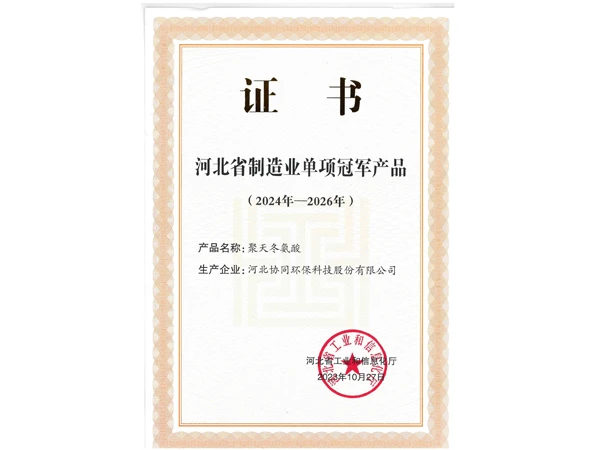
News
Nov . 07, 2024 16:41 Back to list
Effects of Humic Acid on Corn Growth and Soil Health Dynamics
The Role of Humic Acid in Corn Cultivation
Corn, one of the most significant staple crops globally, relies heavily on healthy soil for optimum growth and yield. One of the most promising soil amendments that have gained attention in recent years is humic acid. This organic compound, primarily derived from the decomposition of organic matter, has demonstrated a multitude of benefits that enhance soil health and promote sustainable agricultural practices. In this article, we will explore how humic acid can specifically benefit corn cultivation.
What Is Humic Acid?
Humic acid is a natural polymer that exists in soil as a result of the breakdown of organic materials such as plants and animal waste. Its complex structure allows it to interact with minerals and nutrients in the soil, enhancing their bioavailability to plants. By improving soil chemistry, humic acid plays a crucial role in the overall health of the soil ecosystem.
Benefits of Humic Acid for Corn
1. Enhanced Nutrient Availability One of the primary benefits of humic acid is its ability to chelate (bind) essential nutrients, making them more accessible to corn plants. Micro and macronutrients such as nitrogen, phosphorus, and potassium are crucial for corn growth, and humic acid improves their solubility in soil. Consequently, corn plants can absorb these nutrients more effectively, leading to healthier growth and increased yields.
2. Improved Soil Structure Humic acid contributes to the formation of soil aggregates, which improves soil structure. This enhanced structure increases aeration and water infiltration, crucial factors for corn roots. Well-aerated soil facilitates root respiration and encourages deeper rooting, allowing plants to access moisture and nutrients more efficiently.
3. Water Retention By improving soil structure and increasing organic matter content, humic acid enhances the soil's water retention capability. This is particularly beneficial in stress-prone environments where water scarcity is an issue. Enhanced water retention means that corn plants can withstand dry periods better and utilize available moisture more efficiently, thus increasing resilience against drought conditions.
humic acid for corn

4. Soil Microbial Activity Humic acid serves as a vital food source for soil microorganisms, promoting biodiversity and activity within the soil ecosystem. Healthy microbial activity contributes to nutrient cycling, organic matter breakdown, and disease suppression. An active soil microbiome can enhance the overall health of corn plants, making them more robust against pests and diseases.
5. Stimulating Plant Growth Research indicates that humic acid can stimulate growth hormones in plants, leading to improved seed germination and root development. For corn, this means stronger plants that can establish faster and more effectively. Enhanced growth leads to earlier maturity and potentially higher yields.
6. pH Regulation Humic acid can help buffer soil pH, making it easier for corn plants to access nutrients. Soils that are too acidic or alkaline can hinder nutrient uptake, but the application of humic acid can help maintain an optimal pH range that supports healthy corn growth.
Application of Humic Acid
To maximize the benefits of humic acid in corn cultivation, farmers can apply it in various forms, such as granules, powders, or liquid solutions. The timing and method of application can vary based on soil conditions and farming practices, but it is generally recommended to incorporate it into the soil before planting or during the early growth stages.
Conclusion
Humic acid offers a multitude of benefits for corn cultivation, from enhanced nutrient availability and improved soil structure to increased water retention and stimulation of microbial activity. As the agricultural sector continues to seek sustainable practices, the use of humic acid stands out as a viable strategy to boost corn productivity while promoting soil health. By integrating humic acid into farming practices, corn growers can foster resilient crops that withstand environmental stressors and ultimately contribute to food security in a changing climate.
-
Polyaspartic Acid Salts in Agricultural Fertilizers: A Sustainable Solution
NewsJul.21,2025
-
OEM Chelating Agent Preservative Supplier & Manufacturer High-Quality Customized Solutions
NewsJul.08,2025
-
OEM Potassium Chelating Agent Manufacturer - Custom Potassium Oxalate & Citrate Solutions
NewsJul.08,2025
-
OEM Pentasodium DTPA Chelating Agent Supplier & Manufacturer High Purity & Cost-Effective Solutions
NewsJul.08,2025
-
High-Efficiency Chelated Trace Elements Fertilizer Bulk Supplier & Manufacturer Quotes
NewsJul.07,2025
-
High Quality K Formation for a Chelating Agent – Reliable Manufacturer & Supplier
NewsJul.07,2025
